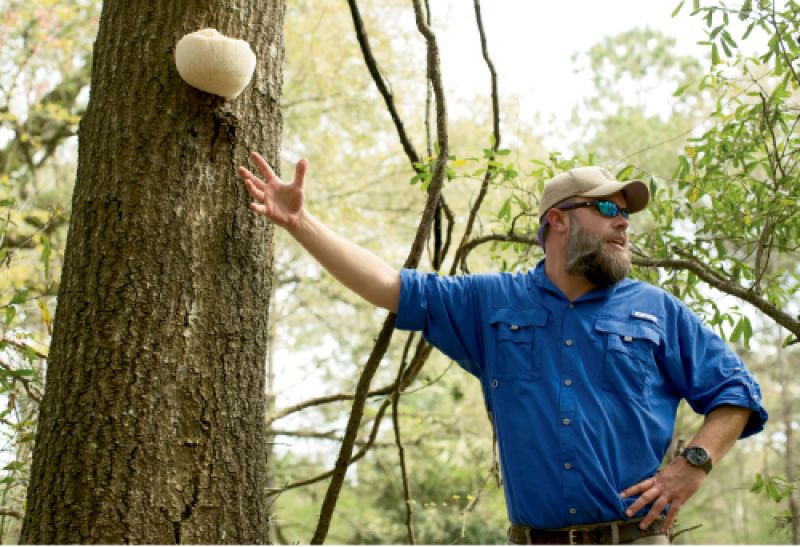
One glance at mushroom forager Micah Garrison’s Instagram feed will make you green with envy. “View from my office today,” he posts, alongside a shot of a lush, boggy Lowcountry forest framed by saw palmetto fans—the perfect breeding ground for tasty maitake, lion’s mane, and black trumpet mushrooms. Who wouldn’t want to step into that frame—and get paid for it, to boot?
For almost a decade, seeking wild mushrooms was strictly a hobby for Garrison, who’s also the full-time director of food and beverage at Middleton Place, where golden chanterelles grow in droves. The property’s plethora of the nutty, apricot-scented ’shrooms inspired him to start foraging back in 2006, but Palmetto State law forbade him from selling or serving his finds. In fact, South Carolina was one of only three states in the country whose health codes were distinctly fungophobic. The laws reflected serious safety concerns—eating the wrong fungi can be lethal—but given that live oaks are the perfect hosts for chanterelles, they also meant a major local food source was untapped. “It was heartbreaking to see a remarkable culinary resource go unutilized,” says Garrison, “especially in the dining mecca of Charleston.”
That all changed in August of last year, when the Department of Health and Environmental Control (DHEC) authorized state-approved mushroom foraging certification courses led by mycology guru Tradd Cotter of Mushroom Mountain, an Upstate cultivation and research facility. Cotter’s students undergo two days of rigorous field training and testing; those who pass are permitted to pick and sell 20 foolproof varieties, including oyster, pecan truffle, and honey mushrooms. Local palates are richer for it—and foragers’ wallets are fatter, too. “There are millions of dollars of mushrooms here, gold underfoot that nobody’s mined yet,” says Cotter, who once picked 60 pounds of chanterelles in the area in a single day. “Plus, it’s sustainable, like picking fruit.”
Since obtaining certification last August, Garrison donates what he gathers at Middleton to the on-site restaurant. As a permit holder, he can also forage in national forests, including the nearby Francis Marion, which covers more than 250,000 acres. Soon, he’ll begin selling those finds under the umbrella of his own company, Palmetto Mushrooms, LLC; chefs such as Craig Deihl of Cypress and Nico Romo of Fish have already expressed interest in becoming clients. For now, though, he’s busy building up inventory. Aside from regular foraging trips, he’s drilled 200 logs with shiitake spawn, which he says will yield some 600 pounds of harvest within the year. And this summer, on a private farm near Columbia he’s partnered with, a greenhouse will be built for indoor cultivation. “The plan is to have a steady stream of cultivated mushrooms growing for resale, as well as wild foraged mushrooms for restaurants and farmers markets,” he explains.
So if you spy mushrooms on a menu this summer, chances are better than ever that they’re fresh, local, and picked by a discerning permit holder. “Before, they might have been from the black market or shipped from somewhere like Oregon,” Cotter says. “Now there’s a safety check, and a growing market for our tropical gourmet mushrooms.”